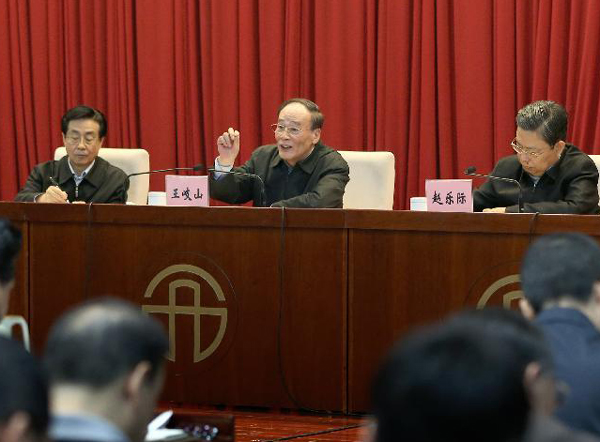|
 |
|
Wang Qishan (center), a member of the Standing Committee of the Political Bureau of the Communist Party of China (CPC) Central Committee and secretary of the CPC Central Commission for Discipline Inspection, addresses a conference on the work of central-level Party inspection in Beijing, China, Feb 11, 2015. [Photo/Xinhua] |
Deputy Party chief of Beijing municipality Lu Xiwen is under investigation for alleged corruption, it was announced on Wednesday. The announcement came a day after it was revealed that Ai Baojun, deputy mayor of Shanghai municipality, was being investigated for suspected corruption. Now all provincial-level administrative regions of the Chinese mainland have one or more senior official under investigation for corruption. Comments:
Whenever a "tiger" (a term that refers to a senior corrupt official) is hunted, people ask questions about timing of the announcement and try to guess whether there is any unspoken rule the disciplinary agency follows. The fall of Ai and Lu might provide good fuel for gossip, because now every province and municipality has a tiger being caged.
Actually, the disciplinary staff follow only one rule, and that is to adhere to Party discipline and the law. When they find clues of possible corruption, they follow strict procedures and check every piece of evidence to make sure every tiger is hunted and every innocent official is kept safe.
In other words, behind every case known to the public is the tireless efforts of the discipline staff.
Yet some corrupt officials make wild guesses about the ongoing anti-corruption storm, so as to try to find a way to stay safe, whether by retiring or hiding their illicit gains.
Such efforts are in vain. The top leadership has clearly and unambiguously expressed its determination to root out corruption, and it is increasingly evident that any official proved to be corrupt will receive his or her deserved penalty. If an official wants to stay safe, there is only one way to do so, and that is by staying clean.
Since the 18th national congress of the Party in 2012, 79 senior officials, including five members of the Party’s central committee, have been expelled from the party and investigated. That’s a good achievement of the anti-graft campaign, as well as a warning that corruption remains rampant. Corruption is still a serious threat to the Party and the health of the government.
That’s also why the anti-corruption campaign is a lasting rather than temporary campaign. Disciplinary watchdogs at various levels must stay alert to the challenge and be resolute in doing their jobs. At the same time, the process of building a cage for power must be accelerated so that corruption will be rooted out instead of being curbed.
China Discipline Inspection and Supervision Daily, Nov 12